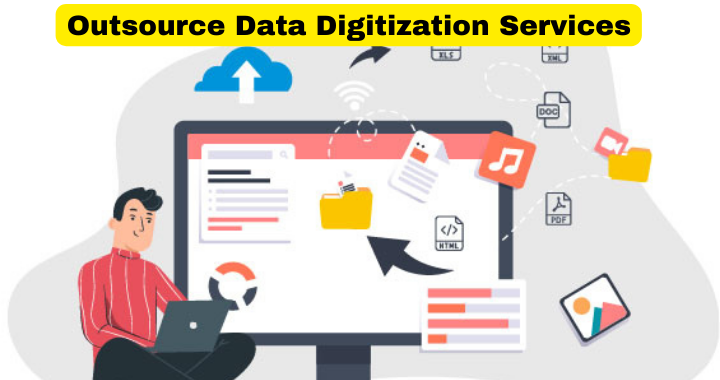Before the invention of the internet, businesses stored their text-based data mostly in physical paper files. Organizations use analog tapes and compact discs to store their data for photos, audio, and video files. This information was carefully saved and kept in safe storage areas for future use. To obtain this material, one had to use physical copies, which was a laborious and time-consuming process. But now Outsource Data Digitization Services are available; the entire process has transformed.
Why the need for Data Digitization Services?
Organizational business needs have changed as a result of the digital revolution. Data could no longer be physically archived. Organizations require constant access to data. An international multi-national company salesperson in India could no longer wait days for a file to arrive from the US corporate office to learn more about a client’s prior dealings.
The information needed to be accessible immediately then and there. Failure to provide the sales staff with such data could lead to a large loss of business, endangering the firm’s future. As a result, companies in various sectors have made the digitalization of outdated data records in organized databases a crucial component of their success.
Data Digitization Services are required for more than just archival data. Today’s organizations regularly produce enormous amounts of data. Although enterprises can now digitize data at the point of generation thanks to the development of technology, many tasks cannot be performed using such a capability.
Public survey forms, sales paperwork, government documents, stamp papers, taxes documents, and legal documents are a few examples of what could fall under this category. Various organizational activities produce these physical documents daily and must be converted to digital format as part of ongoing business operations to ensure their security and accessibility.
The advantages of outsourcing digitalization include
- Gain Access.
Accessibility to essential information is one of digital conversion’s most useful day-to-day benefits. The knowledge worker searches for information for an estimated 2.5 hours daily, or nearly 30% of the workday. Increased hours spent on actual labor result from any attempt to reduce that amount.
Imaging professionals scan and metadata tag your scanned documents so you can find and retrieve them easily. Your remote workforce can effortlessly share data, collaborate on projects, and discover information.
- Cut back on capital expenditure.
It takes specialized tools, optical character recognition (OCR) technology, and knowledgeable employees to digitize documents using the most effective indexing and meta-tagging techniques.
Additionally, scanning papers takes time away from your staff’s primary duties in the business. Hiring a specialized scanning business to handle your digitizing process is considerably more efficient and quick.
- Streamline procedures.
According to Atlassian, only 60% or less of work time is used productively. Imagine working in a setting where there is less need to reinvent the wheel, you are focusing on the most important tasks, and productivity is increasing all at once.
This might be possible if digital conversion is outsourced. Reduce your time on paper-intensive tasks to free up more time for cognitive tasks. Results that are speedier and more precise reduce processing delays and human errors.
- Renovate your office space
By hiring Outsource Data Conversion Services, you can avoid taking up valuable floor space with a large scanning apparatus. High-speed technology requires a lot of room, and office floor space is expensive.
Document scanning also aids in clearing your office of paper. In addition to scanning your articles, a document management business can store them in a secure location or shred them once the operation is finished.
- Boost Compliance and Security
In-house record digitization frequently involves the transfer of documents between several parties. Each stage of the procedure introduces a new chance for a breach or loss. Outsource Data Conversion Services lower the likelihood of this happening thanks to secure chain-of-custody protocols and networks.
Business leaders can see how employees access and use information when documents are digitalized and maintained by automated systems. Even better, most workflow automation software enables authorized users to include access, use, and retention criteria, allowing compliance to be enforced through a single centralized platform.
- Remove Data ROT
Your productivity will be greatly impacted by redundant, absolute, and trivial (ROT) data, which also takes up a large portion of a company’s data storage. According to a recent AIIM survey, around 80% of electronically stored information is ROT.
ROT data clogs your indexes and uses up all your storage space. Finding information is tough due to ROT data. Every scanned record uses the same parts when dealing with an imaging specialist. Hence making your data easy to search for, locate, and recover.
- Choose the appropriate scale and solution.
It’s possible to question where to begin when digitizing paper records. You’ll gain from starting with a strong foundation when working with an expert.
Digitizing all of your documents may not always be in your best interests. Working with a skilled vendor, therefore, enables you to scale the scope of your project and develop a solution that aligns with your organization’s requirements.

